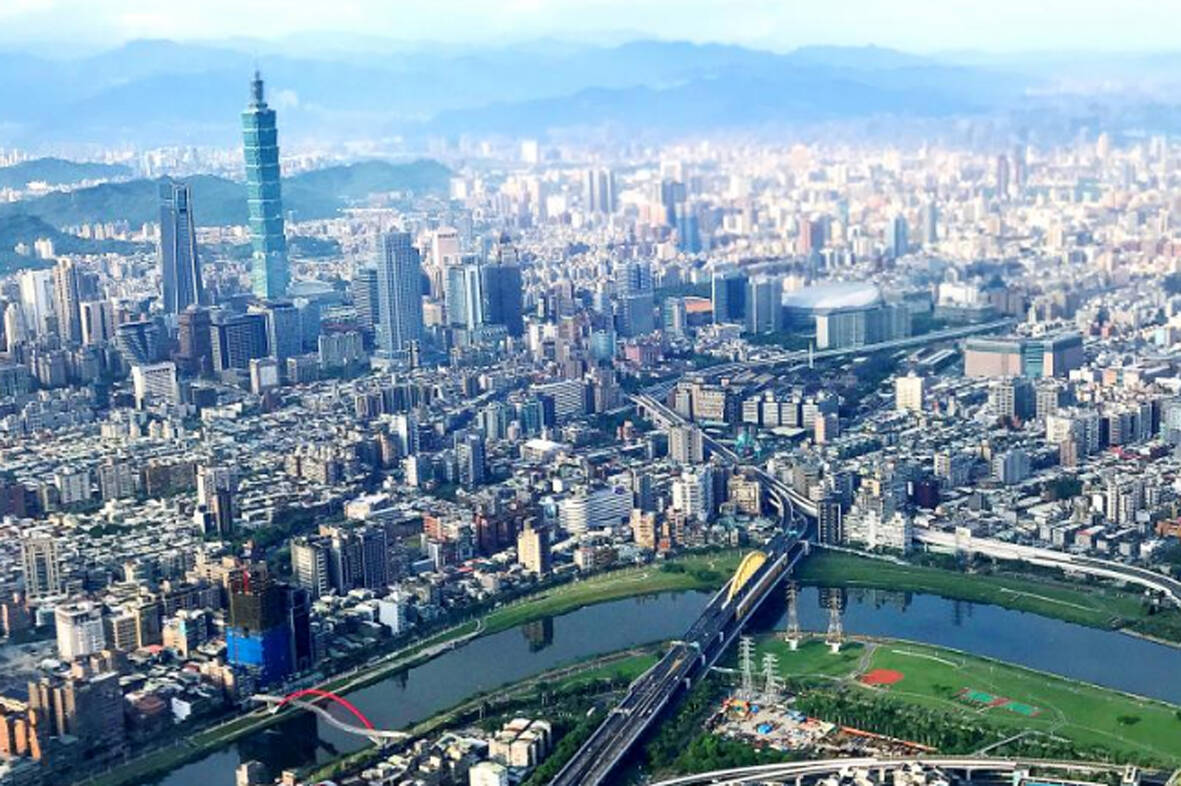More than 50 percent of German businesses in Taiwan said they were positive about the outlook for the Taiwanese economy, the German Trade Office Taipei’s Business Confidence Survey showed.
The strong economic growth Taiwan recorded last year and the country’s thriving industry sector have “fostered optimism among German companies regarding Taiwan’s economic outlook for 2025,” the office said on Thursday in a statement released with the annual survey.
The survey showed that 51.6 percent of respondents expected Taiwan’s economy to continue to improve this year, while 53.1 percent remained optimistic about the three-year outlook.

Photo: Tyrone Siu, Reuters
Taiwan reported GDP growth of 4.3 percent last year, a better-than-expected result and a three-year high, Directorate-General of Budget, Accounting and Statistics data released on Jan. 24 showed.
The performance of many German firms in Taiwan improved last year, trade office chief representative and executive director Eva Langerbeck told a news conference in Taipei.
The survey showed that 62.8 percent of companies reached their business targets last year, up 10 percentage points from 2023, the office said.
Taiwan remains an important market in Asia for German businesses, but they still face global and domestic challenges, Langerbeck said.
The survey showed that 63.2 percent of respondents listed Taiwan’s economic growth as their top concern, while 55.8 percent were worried about cross-strait relations.
It also highlighted concerns about stable energy supply expressed by 57.9 percent.
It said that “diversifying energy sources and building robust backup energy systems” were viable solutions.
There are also domestic challenges, including import restrictions and issues in tender processes, the report said.
For the first time since 2017, more German companies said that they would refrain from investing over the next two years (41.7 percent) than said they did plan to invest in the period (39.6 percent), the report said.
Taiwan’s economic performance has been supported by the involvement of German businesses in industries, notably the semiconductor and auto sectors, Ministry of Economic Affairs Department of Investment Promotion director-general Emile Chang (張銘斌) told the news conference.
Taiwan and Germany should work together to face challenges amid US President Donald Trump’s policy of increasing tariffs for the semiconductor industry, Chang said, citing President William Lai’s (賴清德) proposal to establish a “global semiconductor democratic supply chain partnership initiative.”
The German Trade Office Taipei is “part of the worldwide network of German Chambers of Commerce Abroad,” it says on its Web site.
The survey was conducted from Nov. 13 to Dec. 20 last year, the trade office said.
There was a “high” response rate, with 37 percent of the 260 eligible businesses contacted for the survey submitting valid responses, it said.
The survey was first conducted in 2012.

Taiwan has received more than US$70 million in royalties as of the end of last year from developing the F-16V jet as countries worldwide purchase or upgrade to this popular model, government and military officials said on Saturday. Taiwan funded the development of the F-16V jet and ended up the sole investor as other countries withdrew from the program. Now the F-16V is increasingly popular and countries must pay Taiwan a percentage in royalties when they purchase new F-16V aircraft or upgrade older F-16 models. The next five years are expected to be the peak for these royalties, with Taiwan potentially earning

STAY IN YOUR LANE: As the US and Israel attack Iran, the ministry has warned China not to overstep by including Taiwanese citizens in its evacuation orders The Ministry of Foreign Affairs (MOFA) yesterday rebuked a statement by China’s embassy in Israel that it would evacuate Taiwanese holders of Chinese travel documents from Israel amid the latter’s escalating conflict with Iran. Tensions have risen across the Middle East in the wake of US and Israeli airstrikes on Iran beginning Saturday. China subsequently issued an evacuation notice for its citizens. In a news release, the Chinese embassy in Israel said holders of “Taiwan compatriot permits (台胞證)” issued to Taiwanese nationals by Chinese authorities for travel to China — could register for evacuation to Egypt. In Taipei, the ministry yesterday said Taiwan

Taiwan is awaiting official notification from the US regarding the status of the Agreement on Reciprocal Trade (ART) after the US Supreme Court ruled US President Donald Trump's global tariffs unconstitutional. Speaking to reporters before a legislative hearing today, Premier Cho Jung-tai (卓榮泰) said that Taiwan's negotiation team remains focused on ensuring that the bilateral trade deal remains intact despite the legal challenge to Trump's tariff policy. "The US has pledged to notify its trade partners once the subsequent administrative and legal processes are finalized, and that certainly includes Taiwan," Cho said when asked about opposition parties’ doubts that the ART was

If China chose to invade Taiwan tomorrow, it would only have to sever three undersea fiber-optic cable clusters to cause a data blackout, Jason Hsu (許毓仁), a senior fellow at the Hudson Institute and former Chinese Nationalist Party (KMT) legislator, told a US security panel yesterday. In a Taiwan contingency, cable disruption would be one of the earliest preinvasion actions and the signal that escalation had begun, he said, adding that Taiwan’s current cable repair capabilities are insufficient. The US-China Economic and Security Review Commission (USCC) yesterday held a hearing on US-China Competition Under the Sea, with Hsu speaking on